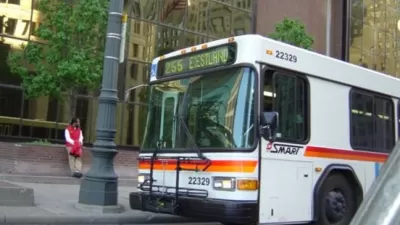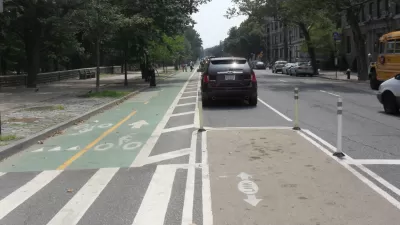Fiat Chrysler’s plan for a new Jeep plant in Detroit is off to a rocky start.

Representatives from Fiat Chrysler and the city held the first public meeting related to a proposed Jeep plant that would bring billions of dollars in investment and thousands of jobs to Detroit. The meeting was part of the city's Community Benefit Ordinance, reports John Gallagher:
The ordinance requires that any major project must negotiate a package of benefits with the surrounding neighbors before City Council signs off on it. Typical benefits paid by the developer would include money for schools and recreation centers, limits on truck traffic and pollution, and other good stuff.
Gallagher says it was a "sometimes raucous meeting," with residents raising a host of concerns about the role of the neighborhood advisory committee, employment opportunities for neighborhood residents, and heavy truck traffic in the area. "Given the long history of corporations either abandoning Detroit or steamrolling residents with new projects like the General Motors Hamtramck Assembly plant in the 1980s, the skepticism was entirely reasonable."
New York's experience with Amazon—and a planning process that lacked transparency and community involvement—offers important lessons for Detroit, adds Gallagher. "Even projects that sound wonderful when announced carry burdens for the local host community. And the voices of the local community are too often ignored as the deals are being negotiated in secret."
FULL STORY: It's understandable Detroiters are skeptical about new Jeep plant

Maui's Vacation Rental Debate Turns Ugly
Verbal attacks, misinformation campaigns and fistfights plague a high-stakes debate to convert thousands of vacation rentals into long-term housing.

Planetizen Federal Action Tracker
A weekly monitor of how Trump’s orders and actions are impacting planners and planning in America.

In Urban Planning, AI Prompting Could be the New Design Thinking
Creativity has long been key to great urban design. What if we see AI as our new creative partner?

King County Supportive Housing Program Offers Hope for Unhoused Residents
The county is taking a ‘Housing First’ approach that prioritizes getting people into housing, then offering wraparound supportive services.

Researchers Use AI to Get Clearer Picture of US Housing
Analysts are using artificial intelligence to supercharge their research by allowing them to comb through data faster. Though these AI tools can be error prone, they save time and housing researchers are optimistic about the future.

Making Shared Micromobility More Inclusive
Cities and shared mobility system operators can do more to include people with disabilities in planning and operations, per a new report.
Urban Design for Planners 1: Software Tools
This six-course series explores essential urban design concepts using open source software and equips planners with the tools they need to participate fully in the urban design process.
Planning for Universal Design
Learn the tools for implementing Universal Design in planning regulations.
planning NEXT
Appalachian Highlands Housing Partners
Gallatin County Department of Planning & Community Development
Mpact (founded as Rail~Volution)
City of Camden Redevelopment Agency
City of Astoria
City of Portland
City of Laramie





























